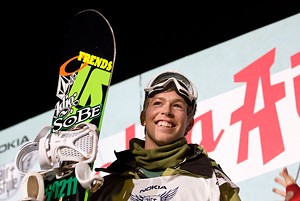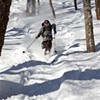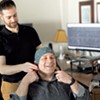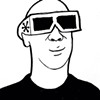Published June 19, 2013 at 4:55 a.m.
Two professional snowboarders swoop through the credits of a new documentary, playing an effortless game of follow the leader in a half-pipe. The clip was filmed in 2007. One of the riders — Shaun White — became one of the best snowboarders in the world, winning nearly every major competition and taking gold at the Vancouver Olympic Games. The other rider, Hartland native Kevin Pearce, spent the Vancouver Olympics in a hospital bed, recovering from a traumatic brain injury he suffered just 49 days before the games.
Pearce’s devastating 2009 accident in Park City, Utah, and his slow recovery are the subjects of The Crash Reel, a documentary by Lucy Walker (Devil’s Playground, Waste Land). The film premiered at the 2013 Sundance Film Festival and will be shown on HBO on July 15. It will also be screened this Saturday, June 22, at Dartmouth College, at the request of the Pearce family as a thank-you for the Upper Valley community’s support. (Kevin is the son of noted glassmaker Simon Pearce.)
The Crash Reel chronicles Pearce’s single-minded dedication to the sport, his years of victories over its top athletes (including White) and the training accident that ended his professional snowboarding career. It’s also a gut-wrenchingly beautiful story about determination and searching for fulfillment when the thing that defines you is taken away.
Walker and Pearce met at a Nike conference where she was mentoring; he was still in the early stages of his recovery. Walker was familiar with Pearce’s story, thanks to the overwhelming support from his closest buds, the so-called “Frends Crew” (there’s no “I” in “friends,” they claim). They printed up the red and blue “I Ride for Kevin” stickers that plastered virtually every snowboarder’s bumper, board and helmet in 2010.
During interviews after shooting The Crash Reel, Walker said she knew as soon as she met Pearce that she would make his story into a film — even though no one knew how the ending would look. Kevin Pearce and his family were similarly eager to make something happen.
“I felt so lucky to have this amazing network to help me get through this — I got hurt and went all the way to the bottom, but I put the work in and believed I could come back,” Pearce said during a phone interview from Carlsbad, Calif., last week. “I thought it was important to share that experience with people if I could.”
Pearce had another agenda, too: educating people about traumatic brain injuries. Like most action-sports athletes, Pearce and his Frends can recite a laundry list of severe injuries. But, until Pearce landed in the hospital, brain injuries weren’t typically on that list.
“I’ve probably had, I don’t know, maybe eight or nine concussions in my life, and my friends, too, and I’d never heard of a traumatic brain injury,” Pearce said. “It just wasn’t something people were talking about.”
Walker’s film is an intensely personal testament to the brain’s power over the body, largely told through 20 years of amateur footage of Pearce’s family and friends and televised coverage of competitions. The visual record of his near-fatal 2009 accident is sickeningly sharp. Or, as Walker described it in a recent interview, “as if you’d set up a camera and asked someone to have a life-changing crash in full focus at the center of the frame, and then slither to the bottom of the frame.”
Other segments of the story were recorded via GoPro helmet cams or cellphone videos, or excerpted from the Pearce family’s home movies. Walker’s sensitive editing fuses the pieces into a deeply personal exposé of how it feels to go from being the best in the world to measuring success on a different scale.
That makes it tough to watch. The damage the TBI wreaked on Pearce’s body is painfully and meticulously catalogued in the film. The accident in Park City left him in a coma for about a week. He woke up unable to communicate, surrounded by his tight-knit family, which marked his progress in terms of finger twitches or eye blinks. Even when Pearce managed to walk unaided, progress remained slow.
Walker skips none of this in her film. In one scene, Pearce goes in for his two-year checkup and meets another TBI patient — Grant Russum, a one-time snowboarding enthusiast who can do little more than mumble a few words from his wheelchair. After a short one-way conversation about snowboarding, Pearce turns to his mother and whispers vehemently, “I wasn’t like that. I wasn’t like that.” Pia Pearce just contradicts him wordlessly, with tears in her eyes.
Kevin Pearce is quick to recognize the role his parents and his three brothers, Adam, Andrew and David, had in his recovery. Walker spends a substantial amount of time with her camera on David, who talks eloquently about his own struggles with Down syndrome. David is also the only family member who openly expresses the family’s concerns to Kevin when he starts talking about snowboarding again.
“David is such a huge, huge part of our family, and Lucy did a great job of seeing that, and seeing how hard my accident affected him,” Pearce said. “When I was going through everything, I never saw how much it really hit David — and then you watch the movie, and you’re just like, Damn, it really, really affected him.”
It’s David whose vehement protests finally persuade his brother not to attempt a return to competitive snowboarding. That hasn’t stopped Pearce from starting to ride powder in the backcountry, though, or from surfing during the summer. He’s also working on recovering some of the joy snowboarding gave him by other means.
“I’m still trying to figure out exactly how to explain what snowboarding means to me and how it fulfills me,” Pearce said. “I think it’s because I found something that I was really good at, and that’s pretty special. I was never really successful at anything else in life, so to have snowboarding and to be at such an elite level was just … incredible.”
Pearce has started speaking to groups about TBIs and the importance of wearing a helmet; he noted that announcing at competitions and public speaking both help him recapture the feeling of being in front of a crowd on a snowboard. He’s also launching a campaign called #LoveYourBrain, a concept he and Walker came up with as the documentary developed. While the filmmaker has taken on the social-media aspect of the campaign, Pearce wants to make the effort even bigger, and he speaks fervently about what he aims to convey.
“I want people to know about all the things you deal with when you have a brain injury, because it’s a daily struggle, and I get so mad when I do all these stupid little things wrong,” he said. “It’s so damaging to hate your brain and to blame it — I want people to love their brain and be good to it.
“Your brain is such a complex machine, and we know relatively so little about it,” Pearce continued. “I want people to be aware of TBIs and just to realize how important your brain really is.”
Pearce has several speaking engagements lined up for what he called a “crazy, fully packed summer.” For most of that summer, Pearce will be attending film festivals around the country, with a stop in Vermont for the Frendly Gathering music festival happening June 28 and 29 in Windham. Then he’ll be off to New Zealand and Australia to announce for several snowboarding competitions.
“The next stage of my recovery is finding the fulfillment and whatever it is about snowboarding that made me really feel alive in something else,” Pearce said. “I haven’t found that yet, but I’m doing things that are definitely making me feel good and really happy again.”
"The Crash Reel," Saturday, June 22, 7 p.m. at Spaulding Auditorium, Hopkins Center for the Arts, Dartmouth College, Hanover, N.H. $10. Info, 603-646-2422. hop.dartmouth.edu
The original print version of this article was headlined "Head Strong"
More By This Author
Speaking of...
-

UVM Swimming and Diving Overcomes Budget Cuts to Win Conference for the First Time in Its History
Mar 13, 2024 -

Two Vermont Teens Take On the Cross-Country Junior National Championships
Mar 6, 2024 -

Michael Krasnow Has Spent Decades Giving Kids Skis, Snowboards and a Taste of Independence
Jan 31, 2024 -

Youth Soccer Comes of Age in Vermont, but the Playing Field Is Hardly Level
Nov 1, 2023 -

Next Month Brings the Final Curtain for Palace 9 Cinemas
Oct 27, 2023 - More »
Comments
Comments are closed.
From 2014-2020, Seven Days allowed readers to comment on all stories posted on our website. While we've appreciated the suggestions and insights, right now Seven Days is prioritizing our core mission — producing high-quality, responsible local journalism — over moderating online debates between readers.
To criticize, correct or praise our reporting, please send us a letter to the editor or send us a tip. We’ll check it out and report the results.
Online comments may return when we have better tech tools for managing them. Thanks for reading.














































